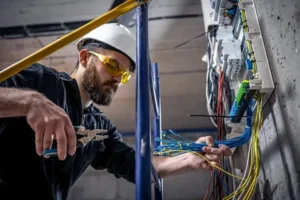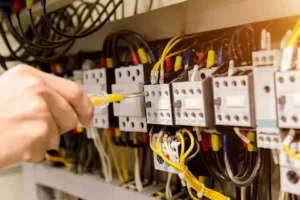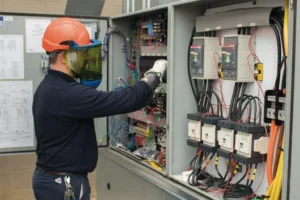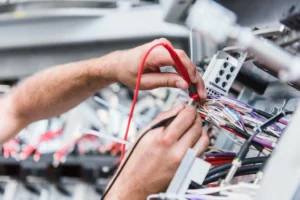The Role of Electrical Services in Modern Life
Electricity powers our homes, businesses, and entire economies. Without professional electrical services, daily life would grind to a halt. From lighting and appliances in the home to industrial machinery and data centers, safe and reliable electrical systems are non-negotiable.
Electrical services fall into two primary categories: residential electrical services (for homes and apartments) and commercial electrical services (for offices, stores, factories, and large facilities). While they share common foundations wiring, circuits, panels, and safety each has its own standards, demands, and regulatory requirements.
This guide explores both categories in depth, providing homeowners, business owners, and facility managers with a clear understanding of what electrical services include, why they matter, and how to choose the right provider.

Foundations of Electrical Systems
Basic Electrical Concepts
- Voltage (V): The force that pushes electric current through wires.
- Current (I): The flow of electrons, measured in amperes.
- Resistance (R): Opposition to current flow.
- Power (W): The rate at which electricity is consumed, calculated as Voltage × Current.

Core Components in All Properties
- Electrical Panels / Breaker Boxes : The hub where electricity is distributed.
- Circuit Breakers / Fuses : Protective devices that cut power in case of overloads.
- Wiring : Copper or aluminum conductors connecting outlets, switches, and appliances.
- Outlets and Switches : Endpoints for power delivery.
- Grounding Systems : Ensure safety by redirecting excess current.

Residential Electrical Services
Scope of Work
Residential electrical services focus on safe, reliable, and convenient electricity for homes. Services typically include:
- New home wiring and remodeling projects
- Electrical panel upgrades from 100 amps to modern 200 amps
- Lighting installation: indoor, outdoor, and landscape
- Outlet and switch upgrades, including GFCI outlets
- Appliance hookups: ovens, dryers, HVAC systems, and EV chargers
- Home safety inspections
- Emergency repairs for outages, sparks, or unsafe conditions

Common Residential Electrical Problems
- Flickering lights caused by loose wiring
- Breakers tripping frequently due to overloaded circuits
- Outlets sparking or overheating
- Outdated knob-and-tube wiring in older homes
- Insufficient power for modern devices and appliances

Energy Efficiency in Homes
Modern residential services also focus on reducing energy costs:
- LED lighting retrofits
- Smart thermostats and home automation
- Solar panel integration
- Energy audits for efficiency improvements

Commercial Electrical Services
Scope of Work
Commercial electrical projects are more complex because they must power entire operations. Services often include:
- Large-scale electrical design and installation
- High-capacity panels and transformers
- Three-phase power systems
- Lighting systems for retail, warehouses, and parking lots
- Data cabling and networking power
- Backup generators and UPS systems
- Compliance with NEC and local codes

Common Commercial Electrical Problems
- Overloaded circuits during peak business hours
- Failing emergency lighting or exit signs
- Inconsistent power supply causing equipment shutdowns
- Code violations leading to failed inspections
- Energy inefficiency increasing operational costs

Energy Management for Businesses
Commercial clients are increasingly focused on sustainability:
- LED retrofits for offices and warehouses
- Motion sensor and daylight harvesting controls
- Energy audits to reduce peak demand
- EV charging stations for employees and customers
Key Differences Between Residential and Commercial Electrical Services
Residential Electrical Services
- Single-phase systems (120/240 volts)
- Plastic-sheathed wiring, simpler routing
- Lower load requirements, focused on home appliances
- Local residential codes for compliance
- Periodic inspections every 3–5 years
Commercial Electrical Services
- Three-phase systems (up to 480 volts or more)
- Conduits and more complex wiring layouts
- Heavy loads for machinery and IT infrastructure
- Strict NEC and OSHA compliance
- Annual inspections and ongoing maintenance contracts
The stakes are higher in commercial projects because power interruptions can mean lost productivity, lost revenue, or even life-threatening situations in critical facilities.
Safety, Compliance, and Regulations
Why Electrical Codes Matter
The National Electrical Code (NEC) and local building standards protect people and property. Compliance ensures:
- Fire prevention
- Shock hazard reduction
- Insurance coverage
- Protection against lawsuits
OSHA and Workplace Standards
In commercial environments, OSHA requires compliance for safe electrical installations. Employers are legally obligated to ensure workplace safety.
Importance of Licensed Electricians
DIY electrical work is risky and often illegal. Licensed professionals guarantee:
- Code compliant installations
- Insurance validity
- Warranty protection
- Peace of mind
Emerging Trends in Electrical Services
- Smart Homes IoT devices, app-based monitoring, and smart panels
- Renewable Energy Solar panels, wind power, and battery storage
- Electric Vehicle (EV) Infrastructure Home and fleet charging stations
- Microgrids Localized power generation for resilience
- Building Automation :Energy management systems for commercial properties
Cost Considerations
Residential Costs
- Electrical panel upgrade: $1,200–$3,000
- Whole-home rewiring: $4,000–$15,000
- Lighting installation: $150–$500 per fixture
- EV charger installation: $800–$2,500
Commercial Costs
- New commercial wiring: $4–$12 per square foot
- Panel upgrades: $5,000–$20,000
- Backup generator systems: $10,000–$50,000+
- LED retrofits: Payback often within 2–3 years
Choosing the Right Electrical Contractor
When hiring an electrician, consider:
- Licensing and certification
- Experience in similar projects
- References and reputation
- Insurance coverage
- Up-front, transparent pricing
- Emergency service availability
FAQs
Q1: What is the difference between commercial and residential electrical services?
Residential focuses on homes with single-phase power, while commercial involves larger, more complex systems using three-phase power.
Q2: How often should electrical systems be inspected?
Homes: every 3–5 years. Businesses: annually or per OSHA/insurance requirements.
Q3: Can a residential electrician work on commercial projects?
Not usually. Commercial systems require additional licensing and experience.
Q4: What are signs I need an electrical panel upgrade?
Frequent breaker trips, flickering lights, or adding major new appliances.
Q5: Are LED upgrades worth it for businesses?
Yes, they reduce energy costs significantly and often pay for themselves in under three years.
Conclusion
Electrical systems are the backbone of both homes and businesses. While residential services focus on safe, comfortable living spaces, commercial services demand higher capacity, compliance, and reliability. Both require licensed professionals who can ensure safety, efficiency, and long-term reliability.
Whether you’re a homeowner adding a new appliance or a business upgrading to energy-efficient lighting, choosing the right electrical service provider ensures your property remains safe, functional, and future-ready.

